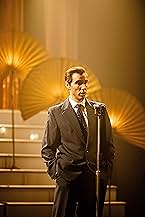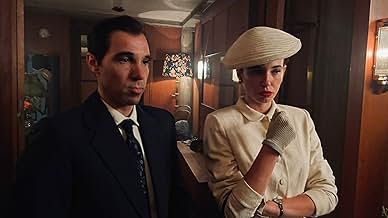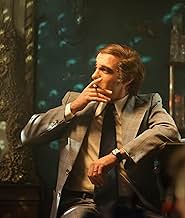IMDb RATING
7.3/10
3.2K
YOUR RATING
Follows the beginnings of the iconic French-Armenian singer, songwriter and actor, Charles Aznavour, from zero to fame.Follows the beginnings of the iconic French-Armenian singer, songwriter and actor, Charles Aznavour, from zero to fame.Follows the beginnings of the iconic French-Armenian singer, songwriter and actor, Charles Aznavour, from zero to fame.
- Directors
- Writers
- Stars
- Awards
- 4 nominations total
Nicolas Chupin
- Jean-Louis Marquet
- (as Nicolas Chupin de la Comédie Française)
- Directors
- Writers
- All cast & crew
- Production, box office & more at IMDbPro
Featured reviews
Been a long, long while since a movie of this quality has been shown in theaters. Throughout the full two hours of the movie, my eyes barely blinked and, somehow, my attention was full all the time. Directing, acting, storyline, culture, tradition, drama, every single aspect of the movie was just perfect. I literally can't imagine it being any better than this. We were just speechless at the end of the movie and couldn't believe that we came to the cinema just to spend some time, and ended up watching one of the best movies we've seen in our lives.
Very big salute to all the producers that made this movie a reality. You have portrayed Aznavour in the absolute best way possible.
Very big salute to all the producers that made this movie a reality. You have portrayed Aznavour in the absolute best way possible.
Solid story, amazing camera work, stellar performance!
The film portrays the humble childhood of the artist Charles Aznavour and his rise to the sublime fame which he worked for really hard. All the technical aspects of the film such as directing and casting, camerawork and cinematography, audio and editing were pleasantly satisfying and are done according to good old classic traditions, which is not the case with the new films nowadays. I imagine this film will appeal to culturally and artistically aware audiences in particular.
Overall a very successful project, worthy of portraying the legendary artist Charles Aznavour.
Many of the audiences left the theatre with tears of nostalgia in their eyes. We watched it at the cinema too and now I'm buying the DVD!
The film portrays the humble childhood of the artist Charles Aznavour and his rise to the sublime fame which he worked for really hard. All the technical aspects of the film such as directing and casting, camerawork and cinematography, audio and editing were pleasantly satisfying and are done according to good old classic traditions, which is not the case with the new films nowadays. I imagine this film will appeal to culturally and artistically aware audiences in particular.
Overall a very successful project, worthy of portraying the legendary artist Charles Aznavour.
Many of the audiences left the theatre with tears of nostalgia in their eyes. We watched it at the cinema too and now I'm buying the DVD!
Musical biopics seem to be one of the most prolific film genres of recent years. 'Monsieur Aznavour' had the premises of a special case, as it is a film whose conception started while Charles Aznavour was still alive. He himself chose the two filmmakers - screenwriters and directors - Mehdi Idir and Grand Corps Malade - and granted them access to his personal archives and in his residences for discussions with him and his family. Aznavour died in 2018, when the film was in pre-production. The two filmmakers let a few years pass before resuming the work at the film, releasing it in 2024, when 100 years since the singer's birth were celebrated. We cannot know how the film would have looked if it had been made when Aznavour was still alive, but it is hard to imagine that it could have been more respectful and reverential in its attitude towards the musician's biography. 'Monsieur Aznavour' is a classic-style biopic, more a docu-drama rather than an artistic interpretation from a different perspective of the artist's life and work.
The script is conceived as a classic biography, almost in documentary style. We first see the little Aznavourian as an 8-year-old boy, living with his family of Armenian refugees following the genocide during the First World War, the difficult years of adaptation and integration in France in the interwar period. With the help of his classic good family (father, mother and his sister Aïda who was his best friend and confidant throughout his life, or in any case throughout the film), the child and then the young man will get through the difficult periods of war and occupation and begin a career as a musician, becoming Aznavour. The change and true launch will occur with the meeting with Édith Piaf, who will make of him her personal driver, favorite composer and the singer who appears as a 'warm-up' at the opening of concerts. The true independent career will only begin when he leaves the tutelage of the great star, who did not believe or did not want to believe in his future as a singer. The road was not easy, some decisions were not optimal, but in the end Aznavour gets where he wanted to, achieving glory and success with the public. The film depicts several key moments in the artist's biography, including famous encounters with personalities such as Johnny Hallyday or Frank Sinatra, his role in Truffaut's film 'Tirez sur le pianiste' or episodes from his private life. The price paid on a personal level was huge. When he had to choose between career and personal life, the former took priority, and the price was paid not only by him but also by those around him.
The script divides Aznavour's life and career into five chapters, with the first three, which describe his difficult youth, his launch, his rise, his crises and the beginning of his success, taking on the greatest importance and occupying most of the screening time. Some aspects of his personal life are ignored (the second of his three marriages is not mentioned at all) or treated rather superficially. In my opinion, the casting of Tahar Rahim in the lead role was not that inspired. He is a talented actor, but with a very different profile. He looks excellent, for example, in the series 'The Serpent', but here I don't think he managed to portray the complexity of this highly talented artist, workaholic, permanently dissatisfied with himself, overcoming shyness with bravery. In addition, sorry, he is too tall for the role. Aznavour's height (1.60m) was part of his personal complexes, he compensated for his anti-male model physiognomy with charisma and warmth. These are precisely what Tahar Rahim lacks, in my opinion. An interesting casting is that of Marie-Julie Baup as Édith Piaf, a very difficult role to play after seeing the film with Marion Cotillard. I liked her acting, same for Camille Moutawakil in the role of Aïda. From time to time, documentary sequences are inserted into the film, short excerpts from what Aznavour filmed on his travels with his amateur camera (another hobby of his) and only at the end we enjoyed original music. Most of the songs are performed by actors, and it is hard to avoid, for those who know and love the voices of Aznavour or Piaf, the unfavorable comparisons. The film was made with many good intentions and looks good. Due to the history of this production, 'Monsieur Aznavour' is probably the most detailed and historically accurate biographical film that will ever be made about Charles Aznavour. But that may not be enough for a very good biographical film. It lacks an original perspective, it lacks the passion and intense artistic and emotional experience that I had every time I saw and heard Aznavour sing. I hope there will be better films about him. Charles Aznavour deserves it.
The script is conceived as a classic biography, almost in documentary style. We first see the little Aznavourian as an 8-year-old boy, living with his family of Armenian refugees following the genocide during the First World War, the difficult years of adaptation and integration in France in the interwar period. With the help of his classic good family (father, mother and his sister Aïda who was his best friend and confidant throughout his life, or in any case throughout the film), the child and then the young man will get through the difficult periods of war and occupation and begin a career as a musician, becoming Aznavour. The change and true launch will occur with the meeting with Édith Piaf, who will make of him her personal driver, favorite composer and the singer who appears as a 'warm-up' at the opening of concerts. The true independent career will only begin when he leaves the tutelage of the great star, who did not believe or did not want to believe in his future as a singer. The road was not easy, some decisions were not optimal, but in the end Aznavour gets where he wanted to, achieving glory and success with the public. The film depicts several key moments in the artist's biography, including famous encounters with personalities such as Johnny Hallyday or Frank Sinatra, his role in Truffaut's film 'Tirez sur le pianiste' or episodes from his private life. The price paid on a personal level was huge. When he had to choose between career and personal life, the former took priority, and the price was paid not only by him but also by those around him.
The script divides Aznavour's life and career into five chapters, with the first three, which describe his difficult youth, his launch, his rise, his crises and the beginning of his success, taking on the greatest importance and occupying most of the screening time. Some aspects of his personal life are ignored (the second of his three marriages is not mentioned at all) or treated rather superficially. In my opinion, the casting of Tahar Rahim in the lead role was not that inspired. He is a talented actor, but with a very different profile. He looks excellent, for example, in the series 'The Serpent', but here I don't think he managed to portray the complexity of this highly talented artist, workaholic, permanently dissatisfied with himself, overcoming shyness with bravery. In addition, sorry, he is too tall for the role. Aznavour's height (1.60m) was part of his personal complexes, he compensated for his anti-male model physiognomy with charisma and warmth. These are precisely what Tahar Rahim lacks, in my opinion. An interesting casting is that of Marie-Julie Baup as Édith Piaf, a very difficult role to play after seeing the film with Marion Cotillard. I liked her acting, same for Camille Moutawakil in the role of Aïda. From time to time, documentary sequences are inserted into the film, short excerpts from what Aznavour filmed on his travels with his amateur camera (another hobby of his) and only at the end we enjoyed original music. Most of the songs are performed by actors, and it is hard to avoid, for those who know and love the voices of Aznavour or Piaf, the unfavorable comparisons. The film was made with many good intentions and looks good. Due to the history of this production, 'Monsieur Aznavour' is probably the most detailed and historically accurate biographical film that will ever be made about Charles Aznavour. But that may not be enough for a very good biographical film. It lacks an original perspective, it lacks the passion and intense artistic and emotional experience that I had every time I saw and heard Aznavour sing. I hope there will be better films about him. Charles Aznavour deserves it.
To be honest, I did not really know what to expect from this movie. Of course I have heard from Charles Aznavour and know a bit about his background, but his songs sometimes seemed too theatrical. So, unbiassed, I went to see the movie. It was absolutely beautiful, rich in details, very close attention to different time frames during which the movie was set (e.g. The clothing) and the acting simply is very good. Now understanding the often personal background to Aznavour's songs, I came to appreciate them even more. The end was chosen carefully (no spoiler!) and moved me - together with most of the audience - to tears. Go see it, it is a gem!
A nice movie about a grandiose figure of French and world culture.
However, the taste after watching is very sweet. Such an aftertaste, as after you took sugar from a sugar bowl with a big spoon and put it in your mouth as a child. There is not enough disclosure of dramatic and tragic moments of the hero's life, which happen in the life of each of us. Even being under occupation during WWII was shown quite easily and naturally, with the exception of a couple of scenes.
Even if you are not a fan of Aznavour's work and songs, the film is recommended for viewing to immerse yourself in the atmosphere of Europe during the almost whole 20th century!
However, the taste after watching is very sweet. Such an aftertaste, as after you took sugar from a sugar bowl with a big spoon and put it in your mouth as a child. There is not enough disclosure of dramatic and tragic moments of the hero's life, which happen in the life of each of us. Even being under occupation during WWII was shown quite easily and naturally, with the exception of a couple of scenes.
Even if you are not a fan of Aznavour's work and songs, the film is recommended for viewing to immerse yourself in the atmosphere of Europe during the almost whole 20th century!
Did you know
- TriviaTahar Rahim performed his own singing for the movie. Before shooting, he took singing lessons, piano lessons and posturing lessons for months to mimic Charles Aznavour's voice and body language.
- ConnectionsReferences Shoot the Piano Player (1960)
- SoundtracksLa Bohème
Music by Charles Aznavour
Lyrics by Jacques Plante
Performed by Charles Aznavour and Tahar Rahim
- How long is Monsieur Aznavour?Powered by Alexa
Details
Box office
- Budget
- €26,000,000 (estimated)
- Gross worldwide
- $16,140,731
- Runtime
- 2h 13m(133 min)
- Color
- Aspect ratio
- 2.35 : 1
Contribute to this page
Suggest an edit or add missing content
























